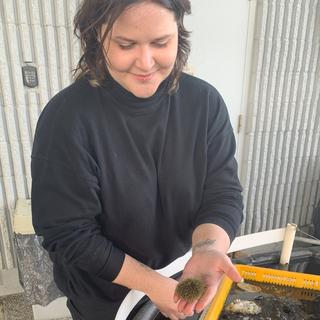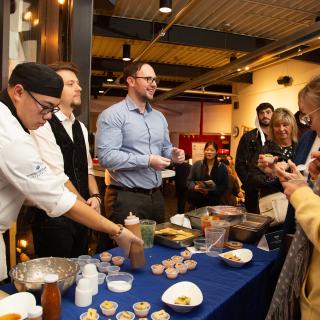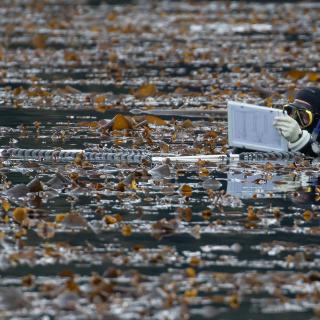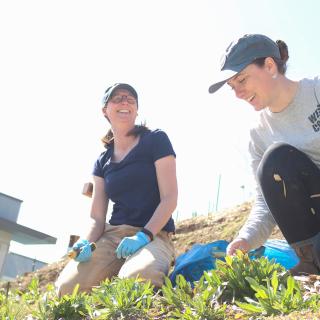VIU Microbiology Professor Dr. Andrew Loudon’s research focuses on the relationship between animals and microbes. Vancouver Island University Photo
Dr. Andrew Loudon received a $165,000 NSERC Discovery Grant to pursue his research.
Dr. Andrew Loudon is working to protect the Columbia spotted frog from a deadly disease and breed a more disease-resistant and resilient Pacific oyster.
The Vancouver Island University (VIU) microbiology professor’s research focuses on the relationship between animals and microbes. He’s looking into how these microbes (bacteria) affect an animal’s ability to fight disease or deal with environmental challenges caused by climate change. He is also examining the peptides frogs produce, a form of their innate immune system, as some frogs have anti-microbial peptides that may essentially control which microbes live on their skin.
“Animals have microbes, bacteria, that are associated with them. As humans, we have bacteria on our skin, in our gastrointestinal tract and other places,” said Loudon. “When people think of microbes they think about food-borne illnesses and getting sick, but what I’m examining are the good microbes that help us.”
Loudon is trying to understand why animals have the microbes they do, how the microbe communities form and what impact they have on the animals.
For the Columbian spotted frog, Loudon is researching whether certain microbes can defend against a fungal pathogen named Batrachochytrium dendrobatidis. This fungus is killing amphibians worldwide. Loudon is researching whether the anti-microbial peptides produced by the frogs affect which skin bacteria live on the frogs. This would be a demonstration of a host controlling its microbiota. This knowledge could lead to selectively breeding frogs to have the right skin peptides and skin bacteria to fight disease. This work is in collaboration with Dr. Brandon Sheafor a Professor of Biology at Carroll College in Helena, Montana.
“We’ve seen a few local extinction events. It’s the cut of a thousand knives situation with animals and conservation. Having a disease is one of those negative impacts. Couple that with habitat destruction, noise or chemical pollution and that’s when you see those massive declines,” said Loudon.
Frogs are vital for mosquito mitigation and the ecological health of areas. He said in some cases in the tropics where there have been massive declines or extinctions, there are environmental consequences. Streams where frogs have died have different nutrient levels than before and sometimes too many algae are growing, which changes the dynamics of the stream and affects diversity.
Loudon is working to protect Pacific oysters from the Vibrio pathogen. The disease causes high death rates in farmed Pacific oysters. Working at the Deep Bay Marine Research Station with VIU’s Canada Research Chair in Shellfish Health and Genomics, Dr. Timothy Green, Loudon and his students are asking whether microbial manipulations early in larval development affect the long-term health of farmed oysters. For example, his team is taking oysters with resistance and susceptibility to the disease and placing them in header tanks. Header tanks are the area that filters water into the tanks where larval oysters are raised. He’s trying to determine if exposing the growing larval oysters to the microbes on the adult oysters will change their bacterial communities and susceptibility to disease.
“If we can breed oysters that have the right microbes so they are more resistant to stressors and diseases you can increase the yield and farmers in BC can increase their yield, which increases our food security,” said Loudon.
Loudon received a Natural Sciences and Engineering Research Council of Canada (NSERC) Discovery Grant of $165,000 distributed over five years to pursue his research. He also received a Discovery Launch Supplement, a grant for early career researchers, of $12,500.
-30-
Media Contact:
Rachel Stern, Communications Officer, Vancouver Island University
C: 250.618.0373l E: Rachel.Stern@viu.ca | X: @VIUNews





